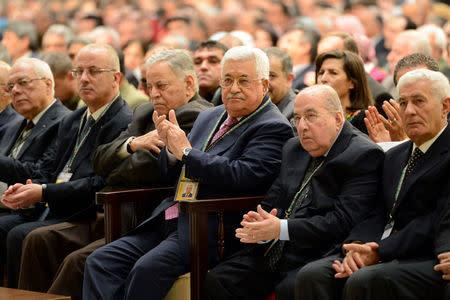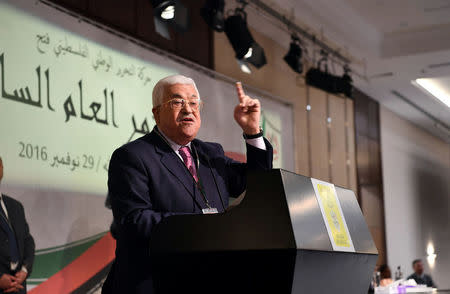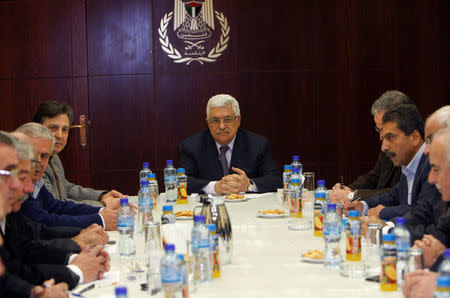Before faithful crowd, Abbas opens delayed Palestinian party congress
By Ali Sawafta RAMALLAH, West Bank (Reuters) - Palestinian President Mahmoud Abbas opened the first congress of his Fatah party for seven years on Tuesday, with 1,300 mostly elderly delegates gathered to elect new leaders and discuss longer-term policy, including how to confront Israel. The meeting comes at a challenging time for Abbas, following Donald Trump's election in the United States, an event many Israelis see as a boost for Israel's settlement-building on occupied land the Palestinians seek for their own state. "You today, in these historic times, are living the writing of modern history," Abbas said as he opened the meeting, praising Fatah's founders and the "martyrs who died along the path towards freedom and independence". The congress was supposed to be held two years ago, but political divisions, both within the party and between Fatah and the rival Islamist Hamas movement, led to repeated delays before Abbas fixed the date only a couple of months ago. Since then, he has strived to sideline opposition, especially from Mohammed Dahlan, a former security chief and Fatah official who now lives in self-imposed exile in the Gulf, from where he has become a vocal and tireless Abbas critic. While Dahlan retains some support in Fatah, Abbas has reduced the number of people invited to this congress - at the last in 2009 there were 2,500 delegates - to limit his rival's influence. Dahlan was also ejected from the party. The meeting, scheduled to last five days, will elect new faces to Fatah's 21-member central committee, the party's top decision-making body, and a new 80-person revolutionary council, a quasi-parliament. With Dahlan frozen out, the elderly and predominantly male invitees are expected to vote in favor of Abbas loyalists, ensuring the 81-year-old president is shored up in his position, despite increasing whispers of criticism. PARTY FAITHFUL As Abbas, known as Abu Mazen, entered the congress, held inside the Muqata, the presidential complex in Ramallah, all the delegates rose to give him a standing ovation. "Abu Mazen go forward, we are behind you until liberation!" chanted some sections of the hall. Waving to the crowd, the gray-haired, slightly stooped Abbas, who has received medical treatment in recent weeks, made his way to a throne-like chair in the front row and listened to an imam sing verses from the Koran to open proceedings. After making a short opening address, Abbas was nominated to be re-elected as head of Fatah and approved by acclamation. He will formally address the gathering later on Tuesday. Critics of Abbas, who has been in power for 11 years, say it is long overdue for him to nominate a successor. They also want new national elections: Abbas was elected to a four-year term in 2005, and the last parliamentary vote was in 2006. Around a third of the members of the central committee are expected to change as a result of the congress, introducing new blood to the party, although most faces will remain and Abbas will still be chairman of Fatah and the Palestinian umbrella movement, the Palestine Liberation Organization. After the congress, the new central committee will meet and elect from its members a deputy to Abbas within the party. In the coming months, that person may also be confirmed as deputy head of the PLO executive committee, some observers say. If that happens, Palestinian officials say it would likely enshrine the nominee as Abbas's designated successor. (Additional reporting by Nidal al-Mughrabi in Gaza; writing by Luke Baker; editing by Mark Heinrich)



